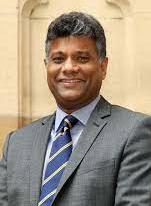Archbishop of Sydney Kanishka Raffel is interviewed by Gavin Perkins
- Can you tell our readers a little bit about your own spiritual journey? What did you find compelling about Jesus when you first encountered him in John’s gospel?
I was saved by the Lord after reading John’s Gospel when I was a University student. I was surprised by the transparent historicity of the Gospel. As I encountered Jesus in its pages, I was struck by the vibrancy and vitality of his humanity. He was not a disembodied ‘voice’ of religious wisdom – he was a real person engaged in relationships with friends, enemies, the needy, the powerful and the powerless. John uses the expression ‘at this, the people were divided..’ on more than one occasion and in the Lord’s kindness, he challenged me with this phrase. I began to ask myself a simple question – ‘Why was I opposed to Jesus?’ When I could offer no good reason, I yielded my life to the Lord.
- As you look out on the worldwide church, particularly the Anglican communion, what signs of life and progress fill you with hope for the future?
I am deeply humbled by the courageous and joyful commitment to church planting and evangelism that is evident in the Anglican Churches of the Global South - in Africa, Asia and South America. I’m struck that in Anglican churches in the majority world there is a great confidence in the gospel, a great submission to the Lordship of Jesus that produces glad obedience and creative and ambitious ministry, and a deep reliance on prayer. All this, often in contexts of poverty, poor infrastructure and corrupt government, or where Christianity is a minority religion.
- And as you look out, what gives you cause for concern?
In the majority world, there is the challenge of avoiding moralism on the one hand and prosperity teaching on the other. In the West, the challenges are arguably greater. Western churches are collapsing as they reject the authority, sufficiency and trustworthiness of God’s Word in a misguided attempt to accommodate themselves to the dominant Western secular paradigm. This is a fatal error because it mistakenly treats late modern Western secularism as a benign host when in fact, our cultural moment is shaped by agendas that are anti-empirical (prioritising the subjective over the objective), anti-social (prioritising the individual at the expense of social groups including the family) and absolutist (brooking no opposition or diversity of opinion or practice).
-
The Diocese of Sydney has more than its fair share of critics. As someone who has spent a good part of your ministry outside of Sydney, what do you value about that particular heritage?
I was nurtured in the faith in Sydney. I learnt to treasure Scripture – to be thoughtful, prayerful, humble and obedient in attending to the living God who speaks in the Bible. I learnt to pray for the salvation of souls and the growth of the gospel as people who are strangers to God’s love and under his judgement come to hear of his Cross and join with us in repentance from sin and faith in Jesus as Lord and Saviour. I learnt that the Lord who saves us by grace, graciously enables us to serve him in works that he has prepared in advance for us to do. I learnt that God displays his glory, wisdom and power in the weakness and foolishness of the Cross, and that those who follow Jesus must take up their cross to do so. I value that Sydney seeks to honour the Lord and his Cross in obeying his Word, proclaiming his love and serving the world for which he died.
- Many are saying that the Anglican Church of Australia is facing a great crisis in the coming years. What do you believe are the key issues that we need to get right as a fellowship of evangelical Anglicans within that wider church?
As a fellowship of evangelical Anglicans we need to keep before us the utter truthfulness, goodness and primacy of Scripture for the life and ministry of the church and individual Christians. Contemporary debates about identity, sexuality, gender and marriage are the particular lenses through which our cultural moment requires us to assert and uphold Scriptural truth.
If we abandon Scripture, we have nothing to offer the world. We must eschew making Jesus in our own image or moulding him to reflect a culture that rejects him. We need to distinguish between issues that are primary and those that are secondary. It’s interesting that when the Jerusalem apostles meet to discuss what will be required of the Gentiles (Acts 15) they do not impose on them religious obligations like circumcision, but require that they abstain from idolatry and sexual immorality.
- What have you been reading in the Scriptures lately, and how has God been applying that word to your own life and ministry?
I’ve been reading the post-resurrection episodes in chapter 21 of John’s Gospel! (They’re among the readings prescribed by the Ordinal for an ordination). A few things have stood out to me. There is the clarity of the mission that Jesus entrusts to Peter – ‘feed my lambs’ (Jn 21:15-17). Then there is Jesus’ kindness in serving his servants. Though the disciples have returned to fishing for fish instead of people, Jesus not only fills their nets (again) but he’s gets breakfast ready for them as well. Jesus by no means fails to care for his servants whom he enlists in his mission (Jn 21:6-14). And finally there is the poignancy of Jesus words to Peter about his future. It is true to say that Jesus has his plans and that we are not privy to them – we must trust him for ourselves and we must trust him for others (Jn 21:18-22).